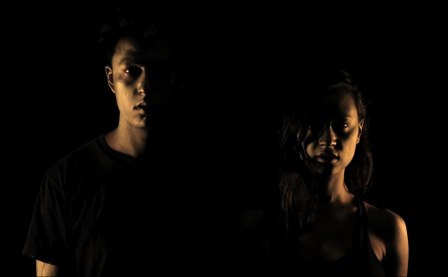From Halifax to Paris, Boston to Benton Harbour, Hey Mother Death absorb the “music of life” that surrounds them, and thrive on encapsulating their adventures through sonic interpretation. Lost in the aesthetics of travel and theatrical sounds, Denma Peisinger and Laurence Strelka blend the two in harmonious matrimony, with their fair share of ups-and-downs, as heard both in this first self-titled EP and their newest LP Highway. Almost as if you’re witnessing the most abstract, non-visual LIVE stage production, creativity flows while listening to Hey Mother Death, and temperaments are akin to a choose-your-own-adventure book circa 1969. Most of all, there is no escape.
Once listeners are grasped by HMD’s new album Highway, a flood of emotions taint what was once your being, and sacredly fill the darkest crevasses of your mentality with a bubble of refreshment. It’s not a morbid trip through the banal, but a freeing journey of human exasperation. Tiny Mix Tapes gripped them during a heavy move from outside Halifax to Cape Breton Island, and they laid out insight into their wonderful world of explorative sounds.
Where’d this white suit come from in your promotional photo? What diner is this at?
Peisinger: Some days you walk into the Salvation Army and are lucky. On that day I was very lucky. Not only was it hanging there gleaming, there was a one-day-only men’s outfit sale. It fit me perfectly.
The diner is John’s Lunch. It’s this little diner in Dartmouth, next to an oil refinery; it’s been under the same family ownership since 1969, and reportedly they have the best fish and chips in Canada. It’s kind of a legend. Nova Scotia is unofficially very racially segregated, but every time we have been in, it has seemed like a interesting intersection point of everybody. It has an amazing vibe in there.
Our friend Harald Hutter came from Paris to NS to shoot the Hills and also photos for our cover. He and I love greasy spoons (Laurence not so much), so we had been telling Harald about it, and every day we would dream of eating fish and chips. We didn’t make it over there until the end of the last day of shooting. Harald had already used all his film, so we were just in there eating, totally tired, and Harald shot that photo with his cell phone, it caught the spirit of how we were feeling the Highway album.
Did y’all grow up in Nova Scotia?
Strelka: I grew up in the South of France, and then moved to Paris when I was 17.
P: I was born in Boston, but my parents moved up to Canada in the 90s.
What kind of car do you drive? What’s your typical source of transportation?
S: A white 1997 Lexus ES 300 that used to belong to Denma’s 96-year-old Nana. She lives in New York, and as you can see from the pics, the car is super bad-ass. But if this album does well we will definitely be driving a non-fossil fuel, non-carbon emitting TESLA, or something like that (all their plans are open source, so hopefully more companies will get with the program). We really feel strongly about climate change, that’s why half of the digital proceeds for the Highway go to 350.org. Until we started country living, we biked everywhere.
How rural is the area in which you live, compared to a more robust urban-centric type of area?
S: Right now, we are driving through Cape Breton Island, moving to our new place, and I don’t think you get more rural than that. It’s not even rural, its wild: there’s nobody except for coyotes, foxes, bears, and moose… Oh, and some lost Scots!
P: We discovered rural living by chance. We had both been based in Paris and Halifax, but after our first EP was released, we somehow ended up in the country to work on Highway, and rehearse and it felt very interesting and extremely productive. When we went back to Paris, and tried to work on Highway, there was so much stress, lack of space, and the feeling that there were so many opportunities and contacts to chase after.
S: When we finally ended up in the French countryside again after those months in Paris we realized, “But we are musicians! Artists!” I mean what matters is the music we play or compose and the way we can live our life, as oppose to hustling around, you know… And it was suddenly so much more inspiring as opposed to the sort of greedy vibe you can get in the city.
P: Our last place — before this one we are moving to — was just 25 minutes from Halifax, but now we are far out there.
What’s the typical HIGHWAY route OUT of where you live?
P: We are on an island, so from our place, it’s about four hours north of Halifax, but for some reason the only way out of here is to drive west. From the Margaree, you can head inland and take the Trans Canada Highway West, or go west down the coast along the Trunk 19, then cross to the Mainland on the Canso Causeway, and keep going West on the Transcanda 104 for two hours until you get to Truro. From Truro you have got an hour going South to on the 102 to Halifax, or keep going West and you have 13 hours until NYC, or 11 hours to Montreal. Wherever you go, there you are.
There are actual lines of Chögyam Trungpa in our songs. “Highway” isn’t a nihilistic song, it’s the opposite: There is no escape from where you are, and that’s good news.
Are y’all friendly with other Halifax musicians?
S: For me, being French and from Paris, Halifax is musically a very effervescent and inspiring place. Same goes for Canada: great stuff is happening with great freedom, as opposed to Paris. There are so many really great Canadian musicians right now, who really allow themselves to be free and don’t worry about trying to fit in a style, or have too many ideas about what’s cool. I really enjoy this freedom, and they are some of the coolest bands around currently; it’s really inspiring. Although there is an amazing Malian community in Paris, with amazing Malian musicians who I got to spend time around, which was so cool, there is so much power and soul in that music, it’s where the blues is coming from.
P: There are some really inspiring musicians and artists here who are also really good people, who have been generous to us. We have been supported from the very beginning here, and although Halifax is relatively small and I have had to leave and live elsewhere from time to time, we just can’t help [but] keep coming back.
S: We have been collaborating with a couple of cool people here on different things and intend to collaborate more in the future.
Has there been formal musical training, or are you self-taught?
P: In the community I grew up in, there was this incredible free jazz drummer, Jerry Granelli. He is from San Francisco, was one of the founders of psychedelic music in the 60s, and along with his career as a solo artist, he played with everybody from Ornette Coleman to Sly Stone to Vince Gauraldi (Charlie Brown Christmas album); he was a family friend. When I was a teenager, I played guitar and was into blues, Hendrix, and African music, but the freedom with which Granelli played music, and the way he worked with form blew my mind. I knew I needed to study with him and be around him. I did his summer workshops, and was considering going to music school, but when I asked to him write me a referral, he said, “I am sorry to say this to you man, but music school will just fuck you up.” He gave me a job building his studio, and I ended up spending a couple of years as his apprentice.
S: I don’t have any formal music training, but I was always a music freak. When I was a kid, I would always listen to tons of music. I had this little ghetto blaster I got when I was 4 years old. I would carry it around everywhere with tapes; all sorts of music that my parents had; cool music. I always felt I had this total connection with music, but never trained. I was a dancer and actress and studied both, but I never pursued music until I started playing with Denma.
Yo, the name of your project: Hey Mother Death. Where does it come from?
S: It is inspired from an Allen Ginsberg poem-song called “Father Death Blues.” At the time we were looking for a band name, we experienced death very closely: a friend and some young people we knew died. It was an interesting moment because for the first time, maybe, we felt the closeness of death, and how it can happen at any moment. We were both reading — me in Paris and Denma in Halifax — the Tibetan Book of the Dead. Allen Ginsberg came up for some reason.
P: He was Buddhist and the poem has a very Buddhist relationship with death.
S: Yeah, and we wanted to use Mother as a homage to the feminine principle.
D: For us, the name is not meant to be dark, it’s actually the opposite: it’s how real life is, and when we play, that’s what it feels like; playing music feels like life and death. That’s what our teachers have told us: from Laurence’s theatre tradition and Jerry Granelli; when you play there is no such thing as rehearsal, because there is no other moment other than what is happening, so you play for real.
What other literature are you both interested in?
S: As we are doing this interview we are on the road, driving to move into our new house, and one of the reasons we decided to live there is because it is filled with amazing books, which I find inspiring… My apartment in Paris was also filled with books; a whole wall was just books. It’s like music, really. I can appreciate anything relevant, it doesn’t have to be a certain kind of literature; lately we have really been into this American, James Baldwin, who is an incredible writer who I would recommend. He has a great take on the world and humanity.
P: His essays and novels are mind-blowing, so touching and… relevant. I think he is simply one of the greatest writers I have ever read. F. Scot Fitzergerald was painful and almost unreadable after reading Baldwin. Baldwin is not known enough, probably because he was black and gay. We love reading so much that sometimes we cut books apart so we both can read different parts at the same time, we recently did that with our poor copy of Miles Davis’s amazing autobiography. Krazy Kat…
S: The lyrics for Highway were written in France and they are the result of the books I was reading at the time. For the song “Highway,” the poetry of Chögyam Trungpa Rinpoche was very influential. For the “Hills,” it is an old text of mine: Jodorowsky, Apollinaire, Antonin Artaud, Georges Bataille, Lydia lunch, Nick Cave, Castaneda, and so many more inspired it…
P: There are actual lines of Chögyam Trungpa in our songs. “Highway” isn’t a nihilistic song, it’s the opposite: There is no escape from where you are, and that’s good news. Another writer Laurence didn’t mention is Jaime de Angulo, whose poem-songs in his book Indian Tales really influenced “Snake Power.”
Is this Denma on the tail-end of “SNAKE POWER?”
P: Yess zat is my voicsss. Mais oui!
More about: Hey Mother Death



